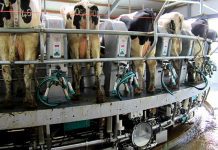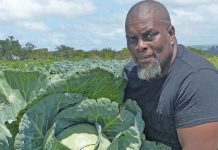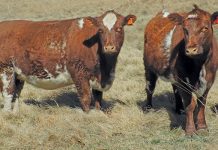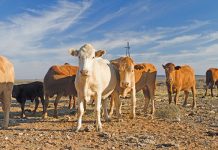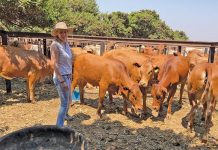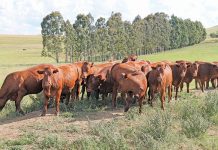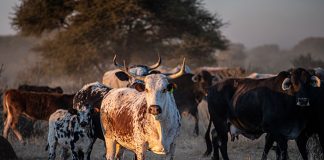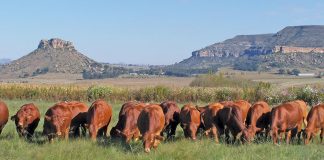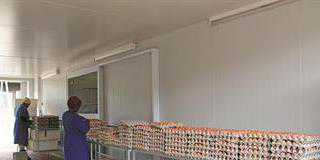Over many years, his home-made, feedgrade urea-based "McCosker Brew" has proved an invaluable tool in his holistic farm-management approach. He recently visited South Africa with a group of 25 Australian farmers for a “knowledge and cross-fertilisation exchange”.
“It all started in the 1970s when I managed a cattle farm in very sour grasslands in the northern territories of Australia where there were major nutritional problems,” recalls Terry, who is a veld, grazing and ruminant nutrition specialist. “After some research, I discovered that we had a protein deficiency in the farm’s natural rangeland vegetation, in the dry season and in the wet season.”
He started experimenting with a water-resistant, protein-based supplement block. “It was pure trial and error. I even used radioactive water to see how much supplement the animals were eating by measuring radioactivity in their blood.”The farm’s nutritional problem started improving and Terry realised he was onto something good. Throughout the 1970s and 1980s he gathered ruminant nutrition research information from around the world.
This included a visit to South Africa in 1982. “South Africa led the world in phosphorous and protein nutrition at the time,” says Terry. “It was also the first country to use urea as a supplement way back in the 1960s. This knowledge was later exported to countries like Australia, where it was readily received.”Finally, in 1990, Terry was ready to share his “brew” with other Australian farmers. In the meantime he’d also established Resource Consulting Services (RCS), an agricultural consulting service, which has a base in South Africa (RCS-SA).
Getting the mix right
“I realised I needed to emulate the way in which the protein from plants and grasses converts to ammonia in the rumen,” Terry explains. “That’s when I started using feedgrade urea, which is a rumen-digestible nitrogen source. Just as plant proteins do, urea stimulates the growth of essential microorganisms in the rumen, which then generate protein.” The microorganisms are key because when grasses or plants become unpalatable with a low protein content in winter, or on lignified or sour veld, the animal’s food intake drops. Its microorganism count plummets and it becomes deficient in energy and protein.
“Many farmers respond to this by feeding the animal a concentrated energy supplement, which is absolutely the wrong thing to do,” says Terry.“The animal needs nitrogen to promote the growth of rumen microorganisms, which is what the brew does at around R0,50 per MLU per day. It’s about feeding small quantities for big gains, not big quantities for small gains.” Apart from feedgrade urea, the McCosker Brew includes several ingredients such as cottonseed meal and molasses, and some unusual minerals, including zeolite.
“The zeolite addition came years later, when I discovered that this was a very porous substance and its honeycomb-like spaces attracted ammonia and exchanged it for sodium and potassium,” explains Terry. “This took the peak off the rumen ammonia level when the urea turned into ammonia in the rumen in 20 minutes – a safety factor in the brew.”
Cutting through the controversy
The brew has attracted some controversy because of its high percentage of urea (up to 40% in cattle). But Terry says this figure is misleading, because the intake is minimal – and cattle intake rarely exceeds 60g to 80g of urea per animal per day, irrespective of the percentage. “All urea-based livestock supplements need hands-on management, and the brew is no different,” he adds.
“It needs to be fed at the correct time, and in the correct amount, with plenty of roughage and water available. “Sufficient trough space is also important, and you need to understand how animal nutrition works. For example, you don’t wait until the grass has lost all its protein with the approach of winter. If you do, you can be sure the animal’s protein level and microorganism population have plummeted.
If you then feed urea, the ammonia can go straight into the bloodstream and kill the animal because of the inadequate microorganism population. “You need to introduce the brew when the veld is still green,” says Terry. “Alternatively, slowly build up the urea percentage in the brew to give the microorganisms time to increase.”The brew has proved to be a life saver for farmers worldwide, but Terry emphasises it needs to be seen as one part of a good herd- and veld-management system.
“The cornerstone of profitable farming is to look after your veld and ensure that you graze and rest it according to the veld type and condition,” he explains. “You also have to take into account the amount of rain you receive – not the average, but for each 12-month period.” Terry’s approach is taught internationally through his Rural Profit System and GrazingforProfit courses. The latter course explains why bigger isn’t always better when it comes to cattle.
“I recommend smaller cattle breeds because a high percentage of the energy in an animal’s diet goes into maintenance. If you have a 550kg cow versus a 350kg cow, then an enormous amount of valuable feed will be used by the 550kg animal to maintain the extra 200kg.”He further points out that bigger cows don’t necessarily produce calves with higher weaning weights. “Many top farmers, including some I visited in the Karoo, achieve excellent weaning weights with smaller cows,” he says.
Promoting the healthier alternative
An advocate of veld-reared or free-range meat, Terry stresses that the public needs to be informed why this is the healthier alternative. “Veld-reared meat is full of healthy Omega 3 fatty acids, which has many benefits, including the prevention and management of cardiovascular disease,” he explains. “However, within 42 days of an animal going onto a high-grain diet, Omega 6 fatty acids replaces Omega 3 fatty acids.
What we need to be healthy is an Omega 6:Omega 3 ratio of below 4:1, but because of the generally poor quality of the average over-processed westernised diet, the ratio is 20:1 – and this contributes to the rise in chronic disease.” Terry points to Food Connect, an organisation founded by farmer Robert Pekin, which seeks to promote wholesome, unprocessed food in Australia by marketing veld-reared meat and a range of fresh produce directly to the public.
Food Connect has a large number of farmers producing for it in several areas in Australia. In Brisbane, more than 4 000 regular buyers each receive a box of fresh produce weekly. Many of the farmers supplying the food use supplements and don’t have to be certified organic – they just need to be committed to improving the natural environment and the quality of food.“Consumers enjoy the fact that they’re buying fresh from farms in their district,” says Terry.
“They pay for their weekly box a month in advance, which is then delivered to them. The farmer gets 50% of the retail price, also paid a month in advance.“I’m aware the farm-fresh box is available on a small scale in cities like Cape Town, but the system could be expanded all over the country. This would also reduce the carbon footprint of food distribution. “The rising price of fuel will drive this process anyway, and Food Connect is a good example of how farmers can be proactive about pressing issues.”
Getting back to basics
The same principle applies to the overuse of chemicals and fertilisers. “This is costly and detrimental to the land, resulting in a situation where a farmer who overuses these products ends up with a very small profit margin,” he says.“Farming is a biological process, not an industrial process. The most important fertiliser a farm can receive is the farmer’s footprints. Farmers who get out there and walk the land inherently understand the biological processes of good land management.“We need to get back to basics and retrace our footsteps.
Take nutrition as an example. Most of the excellent knowledge about nutrition and the use of effective, cost-effective supplements, such as urea, has been lost in South Africa. “I urge farmers to re-think how they farm, and, where necessary, introduce more profitable, flexible and sustainable farming systems,” says Terry. “The time has come for farmers to take back control of how they produce food and improve conditions for themselves.”
For more information about RCS and Terry McCosker, write to: RCS-Australia, PO Box 633, Yeppoon, Q 4703; call 07 4939 5255 or 0419 653227; or visit www.rcs.au.com. For more information about RCS-South Africa, contact Bruce Brown on 072 308 7569, or [email protected].

